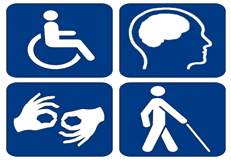What is disability?
A disability is a total or partial, temporary or permanent physical, sensory, mental, communicative, educational or psychological impairment that has a substantial and long-term adverse effect on the disabled person's ability to carry out normal day-to-day activities and making him dependent on others, or in need of special tool, special training and special rehabilitation to use of it.
Statistics indicate that there are some 1.5 million people with disabilities in the Kingdom of Saudi Arabia.
Types of Disability:
- Physical disability: the person is unable to control the motion of an organ or more of his body organs.
- Visual impairment: ranging from the poor vision to complete blindness.

- Hearing impairment: ranging from poor hearing to complete deafness.
- Educational and intellectual impairment: the person is unable to normally learn, remember or process information.
- Mental disorders.
- Disorders in social relations and communication.
The influence of disability varies according to its severity, symptoms, curability and rehabilitation.
Causes of disabilities:
- Genetic disorders: either caused by inherited genes or an external factor.
- Diseases or accidents affecting the mother during pregnancy or delivery.
- Complications triggered by the negligence of treatment, and the inability to control diseases, such as:
- Diseases affecting muscles and joint inflammation.
- Heart diseases and strokes.
- Cancer.
- Diabetes.
- Nervous system diseases.
- Acquired disability, caused by work injuries or accidents.
- Aging.
- Undefined reasons.
Prevention:
You can protect against yourself against some types of disabilities caused by chronic diseases, by controlling these diseases and preventing complications. This is to be achieved through:
- Adopting a healthy lifestyle, having healthy food, exercising and maintaining optimal weight.
- Regular follow-up with the doctor to control the disease.
- Taking the necessary medications regularly.
Rehabilitation of persons with disabilities:
By rehabilitation is meant the preparation of people with disabilities to adapt to and positively interact with the society, through a host of social programs and activities, as well as offering them jobs; work is no less important for them than all other people.
Caring for people with disabilities:
Those living with people with disabilities are supposed to ensure for them a healthy and safe environment, as much as possible. They should:
- Provide daily care for the person with disability, such as hygiene, healthy food and so on, and, if possible, training him on doing their basis tasks by themselves.
- Provide innovative tools and techniques that would help the person with disability to do his daily tasks easily and safely, without the risk of injury.
- Pay close attention to the safety and security of the environment in which the person with disability lives; for example, availing special paths to guide him and make his movement easier.
- Pay attention to the social and mental aspects, which could be improved by organizing regular visits or picnics for recreation.
- Take part in outdoor activities, and subscribe to a club, thus improving the mental and physical state of the person with disability.
- Involve the person with disability in the daily family's daily activities, to promote his self-confidence and hone his skills.
- Pay close attention to education, and developing the mental skills of the person with disability, by providing him with modern educational tools that will make it easier for him to access information.
- Offer the person with disability balanced and healthy food, lest he should suffer from malnutrition problems such as anemia, thinness, obesity and overweight, aside from other diseases owing to immunodeficiency.
Treatment:
The type of health care (drug treatment, physiotherapy, etc.) varies according to the type of disability. It is highly recommended to regularly see the doctor to follow up treatment and take the necessary vaccinations against infectious diseases.